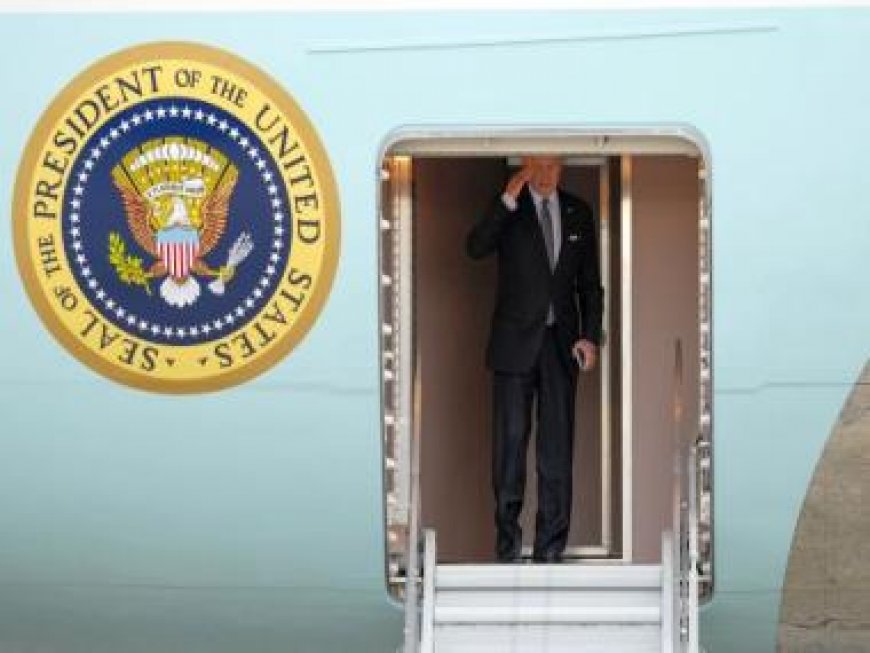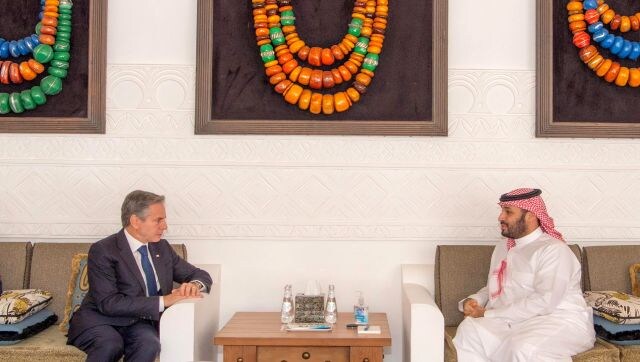First Antony Blinken, now Joe Biden: Can US contain the Israel-Hamas war?
First Antony Blinken, now Joe Biden: Can US contain the Israel-Hamas war?

It’s Day 12 of the Israel-Hamas war and with each passing day, the fear that the battle could plunge the region into a larger conflict becomes more of a reality.
On Tuesday (17 October), US secretary of state Antony Blinken said that President Joe Biden would pay a solidarity visit to Israel on Wednesday (18 October) and reaffirm United States’ solidarity with Israel and “our ironclad commitment to its security”.
After his nearly eight-hour meeting with the defence ministry with Israeli prime minister Benjamin Netanyahu, Blinken, who is on his second visit to the country, added that “Israel has the right and indeed the duty to defend its people from Hamas and other terrorists and to prevent future attacks.”
Initially, Biden was also meant to travel to Jordan where he was scheduled to hold meetings with key regional leaders, namely King Abdullah of Jordan, Egyptian president Abdel Fattah el-Sissi, and Palestinian president Mahmoud Abbas. However, a hospital blast in Gaza, killing hundreds of innocent civilians, has led to a cancellation of the summit. It is reported that Palestinian Authority leader Mahmoud Abbas withdrew from the scheduled meetings in protest of the blast at Al-Ahli Baptist Hospital, which the Hamas-run Health Ministry in Gaza blamed on an Israeli airstrike.
For many geopolitical observers, this step is an attempt by the United States to prevent Israel’s war against Hamas from escalating into a widening regional conflict that could put the world’s economy at risk, and raise further geopolitical concerns.
US’ West Asia diplomatic push
Soon after the Hamas’ deplorable attacks last weekend and a declaration of war was made by Israel, Secretary of State Antony Blinken embarked on a whirlwind and chaotic West Asia visit, trying to ensure that the immediate conflict between Israel and Hamas doesn’t spread into the region.
He first travelled to Israel last week where he said that American support for the Jewish state will never falter. “The message I bring to Israel is this: You may be strong enough on your own to defend yourself. But as long as America exists, you will never, ever have to,” he said, speaking alongside Israeli prime minister Benjamin Netanyahu in Tel Aviv on Thursday.
From there, he moved onwards to Jordan, meeting King Abdullah II and then Palestinian Authority president Mahmoud Abbas last Friday. He also made visits to Qatar, Saudi Arabia and the UAE in efforts to help prevent the conflict from spreading, secure the immediate and safe release of hostages, and identify mechanisms for the protection of civilians.

In Qatar, Blinken said in the presence of the country’s prime minister and foreign minister, Mohammed bin Abdulrahman Al Thani, “What Israel is doing is not retaliation, it is defending the lives of its people.” He stressed that any nation “faced with what Israel has suffered would likely do the same.”
However, the US has met resistance from some of the Arab countries. The Washington Post reports that Saudi Arabia’s Mohamed bin Salman kept Blinken waiting for hours, with the crown prince eventually showing up the next morning for a meeting.
In the meeting, the crown prince reportedly called for Israel to halt military operations “that claimed the lives of innocent people,” after Israel bombarded the densely populated Gaza strip, and imposed a blockade on food, fuel, and other supplies. He also reportedly called for the conflict to be de-escalated.
Similarly in his meeting with Egypt’s Abdel Fattah El-Sisi on Sunday, Blinken met some resistance as Sisi said that “Israel’s response has gone beyond the right to self-defence and amounts to collective punishment”.
Egypt is also reportedly refusing to allow only foreigners, including US citizens, to get out of Gaza via the Rafah border crossing. Egypt controls the entry and exit point. Other crossings are controlled by Israel.
But Blinken at the end of his visit said he was confident “Rafah will be open” and that the US, the UN, Egypt, Israel and others were working on a “mechanism by which to get the assistance and to get it to people who need it”.

A push for global support
Apart from the players in the region itself, the US has also been attempting for other key countries in the world to push for peace and stability in the conflict-ridden zone.
Blinken, it is said, had a one-hour telephone call with Chinese foreign minister Wang Yi, where he urged his counterpart to use its influence in the region to prevent other state or non-state actors from attacking Israel and widening its war with Hamas.
Israel-Hamas war: Our related coverage
Who can broker peace between Israel, Hamas? Can India help?
What the Hamas war means for Israel’s economy and Benjamin Netanyahu
Israel-Hamas war: Could Russia benefit from conflict?
What will happen if Israel invades Gaza?
Why has Israel’s ground invasion of Gaza been delayed?
State Department spokesman Matthew Miller confirming the same said Blinken spoke with Foreign Affairs Minister Wang Yi before departing from Riyadh and said it was “Our message was that he thinks it’s in our shared interest to stop the conflict from spreading.”
The US is particularly concerned about Hezbollah opening an additional front in the war on Israel’s northern border. China has close relations with Iran, and assisted Tehran in brokering a landmark diplomatic agreement with Saudi Arabia earlier this year.

Fears of a larger conflict
As Israel prepares for a ground invasion of the Gaza Strip as part of its ongoing war against Hamas, there are concerns from many that this could result in the conflict growing wider.
Experts worry that this could prompt Hezbollah to send thousands of missiles into Israeli cities, opening a second front in the war. Moreover, Iran’s mission to the United Nations warned that if Israel’s strikes on Gaza don’t stop, “the situation could spiral out of control and ricochet far-reaching consequences.”
There are also tensions at the Lebanon-Israel border, with both sides engaging in cross-border firing.
This could have a negative impact on the world economy, with fears of oil prices skyrocketing, which will affect the cost of living and drive up inflation even further.
The US is also wary that a wider conflict could lead to reprisals by terror groups of Iran-backed militias against its remaining troops in Iraq and Syria, where they are engaged in missions to counter ISIS.
While it is unsure what the future of this conflict will be, there is only one sure thing: The suffering will continue.
With inputs from agencies
What's Your Reaction?



























































